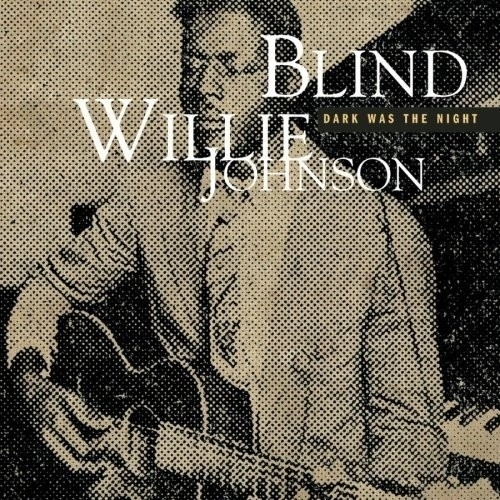100 Favorites Reviewed - [1930] Blind Willie Johnson: "Dark Was the Night"

Blind Willie Johnson
Dark Was the Night (1927-1930)
1930
Genre: Texas Gospel Blues
With one of the gruffest voices in any musical genre, Blind Willie Johnson serves up one legendary early Texas blues track after another, largely from the traditional gospel canon. From the fantastic rendition of “John the Revelator” to the all-moaned title track to (my favorite) “Soul of a Man”, this is one of the best blues collections of all time.
Born in Pendleton, Texas in 1897, Willie was blinded early in life, likely accidentally by his stepmother. Johnson’s unique style seems to be inspired by a religious street singer of the era, Blind Madkin Butler. Not much is known about Butler other than his influence on Johnson’s style.
The title track, “Dark Was the Night, Cold Was the Ground,” is entirely moaned by Johnson as he plays a slow tune on his bottleneck slide guitar. One of the first tracks he recorded for Columbia in 1927, fifty years later it was one of only 27 songs featured on the Voyager Golden Record that was shot into space. Honestly, I’m a little jealous of the aliens getting to experience “Dark Was the Night” for the first time.
While I’ll always place Son House’s version of “John the Revelator” at the top, Johnson’s version is an extremely close second, featuring excellent backing vocals and guitar by his (likely) first wife, Willie B. Harris. We also hear Harris on “Lord I Just Can’t Keep from Crying,” “Church, I’m Fully Saved Today,” “Trouble Will Soon Be Over,” “Praise God I’m Satisfied,” and “Soul of a Man.” Even though Harris' vocals are given less volume in the mix, they act like a cart moving the songs along, providing a consistent rhythmic and harmonic complement to Johnson’s gruff, bouncy sound.
“Let Your Light Shine On Me,” is unique in that in the early parts of the song, Johnson sings in a smooth tenor voice but then jumps to his deep growled voice midway through. At the same time he starts to stomp a rhythm, like the 1920s version of a beat drop. It’s a little disorienting–but not unpleasant!–to hear his unaffected voice.
Songs like “God Moves On the Water” really showcase Johnson’s guitar playing. He sinks into this groove, which may not be the best phrasing to use given the song is about the Titanic, but I’m sticking with it.
The recording quality of this collection is surprisingly crisp given it’s almost 100 years old and doesn’t suffer from the fidelity issues usually associated with recordings from the era. This clarity makes his songs unusually accessible to modern listeners in comparison to the inherent scratchiness of so many other recordings of the time. Johnson’s sound is wholly unique and moving, both vocally and on guitar, showing very clearly why he inspired everyone from Bob Dylan to Nina Simone.
In a sad turn of events, Willie Johnson’s house burned down in 1945. Afterwards, with nowhere else to go, he continued to live in the crispy shell of a home. Wikipedia describes his tragic final days:
Standing out in the winter winds the next day, singing to earn a little money, Willie got sick and within a few days was dying of pneumonia. He contracted malarial fever and no hospital would admit him either because of his visual impairment or […] because he was black. Over the course of the year, his condition steadily worsened until he died, on September 18, 1945. His death certificate reported syphilis and blindness as contributing factors.
Recommended tracks: “Dark Was the Night, Cold Was the Ground,” “Lord I Just Can’t Keep from Crying,” “Let Your Light Shine On Me,” “John the Revelator,” “God Moves on the Water,” “Praise God I’m Satisfied,” “The Soul of a Man”
Review last updated May 7, 2025. originally published April 25, 2025.